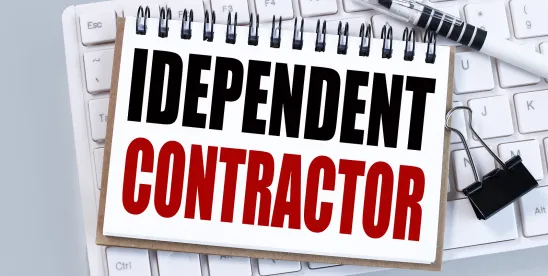The U.S. Department of Labor (DOL) violated the Administrative Procedure Act (APA) when it withdrew a Trump-era Independent Contractor Final Rule (ICFR), a Texas federal court has held. Coalition for Workforce Innovation et al. v. Walsh, No. 1:21-cv-00130-MAC (E.D. Tex. Mar. 14, 2022).
During the Trump Administration, the DOL promulgated a rule, titled “Independent Contractor Status Under the [FLSA]” (the “Independent Contractor Rule”), which sought to clarify the definition of “independent contractor” under the Fair Labor Standards Act (FLSA). Because independent contractors provide specialized skills and often are used in the construction industry, where short-term and fluctuating needs are common, the ICFR is meaningful clarification for the industry.
The Rule
The status of independent contractor under the FLSA has been a point of scrutiny because the FLSA guarantees a minimum wage for all hours worked and overtime for any hours worked over 40 hours per week only for covered, non-exempt employees. The same guarantee does not apply to an independent contractor. In fact, the FLSA is largely silent on how best to determine an employee from an independent contractor.
The ICFR’s primary purpose was to provide clarity to the “economic realities test,” the multi-factor test used by the courts to “determine whether, as a matter of economic reality, an individual is in business for himself or herself as an independent contractor or is an employee of another.”
The “economic realities test” has developed in courts and the DOL with similar, but slightly varying, standards for determining whether an individual is an employee or an independent contractor. These varying standards arose from six, non-exclusive factors the U.S. Supreme Court originally articulated in two cases, United States v. Silk, 331 U.S. 704 (1947), and Rutherford Food Corp. v. McComb, 331 U.S. 722 (1947).
The factors are:
-
The degree of control exercised by the alleged employer over the worker;
-
The worker’s opportunity for profit or loss;
-
The worker’s investment in the business;
-
The permanence of the working relationship;
-
The degree of skill required to perform the work; and
-
The extent to which the work is an integral part of the alleged employer’s business.
Delay, Withdrawal Rules
The ICFR was scheduled to take effect on March 8, 2021. However, on February 5, 2021, the DOL issued a notice of proposed rulemaking (NPRM), proposing a 60-day delay of the Independent Contractor Rule’s effective date (Delay Rule). On March 12, 2021, the DOL issued a NPRM proposing to withdraw the ICFR (Withdrawal Rule). Ultimately, the DOL under the Biden Administration withdrew the ICFR in May 2021.
Court Decision
The federal court opined that the DOL’s Delay Rule failed to engage in notice and comment as required by the APA. It found that the Delay Rule constituted an amendment or rescission of the ICFR. Therefore, the DOL was required to follow the notice-and-comment procedure. In promulgating a notice period of less than 30 days, the federal court found the DOL failed to establish good cause because the DOL failed to establish that any serious, imminent harm would result if there was a postponement in the Delay Rule’s effective date. Rather, the Delay Rule required a comment period of at least 30 days for “interested persons to meaningfully review a proposed rule and provide informed comment.” Finally, the federal court found the DOL violated the APA when it limited the scope of the Delay Rule’s comment period to include only “comments about [the DOL’s] proposal to delay the [Independent Contractor Rule]’s effective date.”
Further, the federal court opined that the DOL’s decision to implement both the Delay Rule and the Withdrawal Rule was arbitrary and capricious because the DOL failed to consider potential alternatives to rescinding the ICFR.
As a result of the federal court ruling that the DOL’s withdrawal of the ICFR was invalid, the ICFR goes into effect immediately, at least until an appeal might be taken.
***
The ICFR does not affect how states determine who qualifies as an independent contractor under their respective wage and hour statutes. It also does not redefine who qualifies as an independent contractor under the Internal Revenue Code, the National Labor Relations Act, or other federal laws. Certainly, the DOL may again undertake formal rulemaking on the issue and adopt a new final rule.




 />i
/>i

